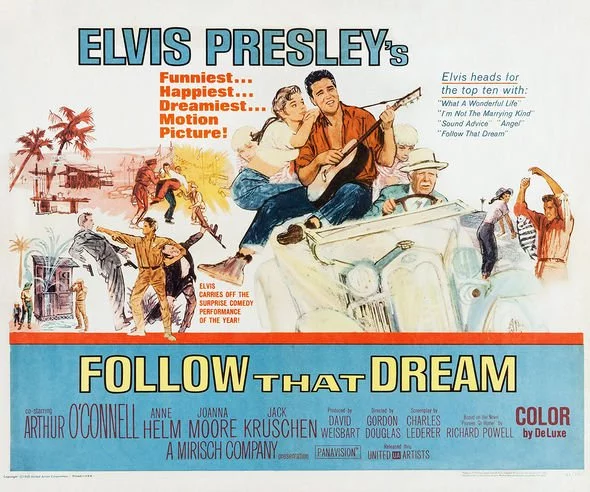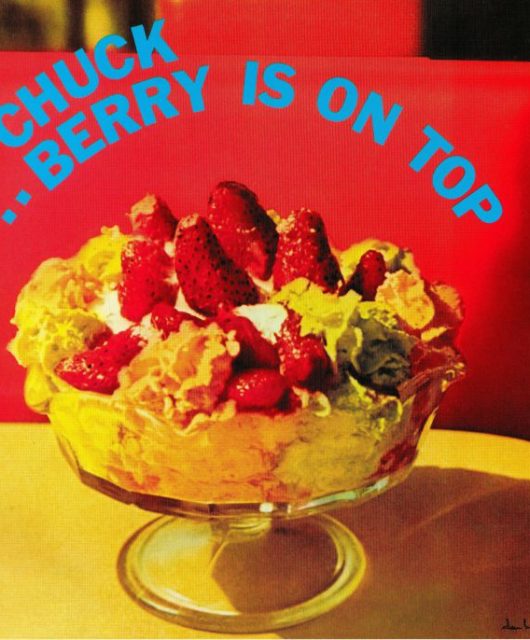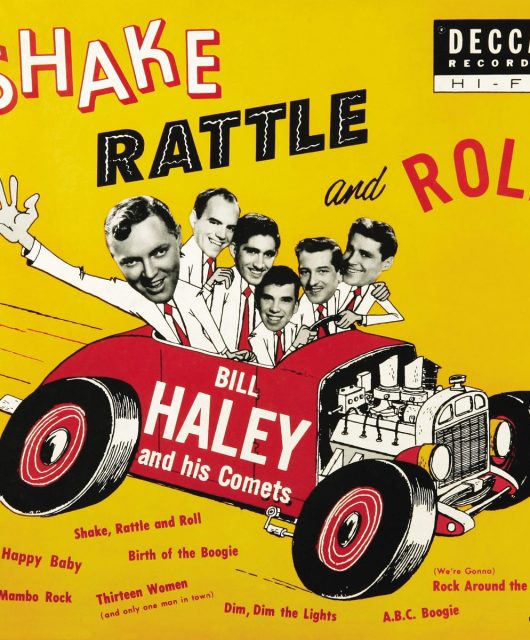Based on a 1959 novel and released 60 years ago this year, this tale of hillbilly homesteaders is an entertaining, if lightweight comedy with Elvis on top form… By Julie Burns
One of the King’s lighter, more pleasing comedies. We meet him as the naïve but upstanding Toby Kwimper, singing a spirited What A Wonderful Life, one of the movie’s title contenders. His unconventional clan, the Kwimpers, are on the road, journeying along the Florida coast. There is Pop (Arthur O’Connell, in a role reprised in Kissin’ Cousins), their sweet-natured former babysitter Holly (Anne Helm), unofficially adopted twins, and a young orphan girl called Ariadne.
Running out of gas, they have to spend the night on the beach. The Kwimpers are discovered the next day by a stuffy official, who learns that they are virtually reliant on the government for money: Toby is a discharged army vet, his father in receipt of tax relief. Pop declares their intention to become homesteaders on the unclaimed land. What transpires is that, from the official H. Arthur King (Alan Hewitt), and an over-amorous child welfare manager Alisha Claypoole (Joanna Moore), to bumbling gangsters Carmine and Nick (Jack Kruschen, Simon Oakland), they’re all conspiring to get rid of the family, one way or another.
Toby, meanwhile, goes fishing, and lands a giant tarpon. Seeing a passerby offering him 20 dollars to get in on the catch, Holly has a bright idea, and they plan to launch a fishing business. To fund it, they first need a bank loan. An amusing scene ensues in which it looks as if Toby is involved in a heist. He offers the Kwimpers’ ‘luxury john’ (toilet) as ‘security’ for their $2,000 loan. Sensing his customer’s innate honesty, bank president Mr Endicott (Herbert Rudley) grants a character loan instead.
Charged with monitoring the family’s ‘moral fitness’, Alisha tries to seduce Toby in the woods. Tempted into a kiss, he resists anything more by reciting his multiplication tables. Seeing the seemingly flirting pair, Holly feels put out, and shoves Alisha into the river. Alisha responds by taking the twins and Ariadne into social care. This entails a day in court, where the Kwimpers plead their fitness as guardians. The plot thickens: in attracting various trailers onto the land, the homestead now attracts ambitious mobsters, who plan to turn the strip into another Vegas, with a mobile casino. When Toby is made sheriff by the locals, the criminals plot to take him out. Happily, neither hitmen nor their makeshift bomb can displace Toby and co.
Richard Powell, writer of Pioneer, Go Home!, the novel the film was based on, had voiced concerns that Presley, on finding out it was a ‘funny’ story, would play it comedically. As the boy from the backwoods, Elvis delivers his scenes – especially the courtroom climax – pitch-perfect. Director Gordon Douglas ensured that his star played it straight throughout, from deadpan delivery to sincere courtroom soliloquy. As author Eric Braun stated: “Presley’s portrayal of guileless innocence has never been bettered.”
Reviews were respectful, noting Elvis had made a film without the ‘wiggle’ factor, and was showing his versatility instead. Films And Filming considered Follow That Dream: “A charming vehicle as well as a nice story based on the American theory that good, simple folk will always triumph over city slickers… the script is witty, the direction clever and Elvis’s part brilliantly conceived.”
It was a tale of innocents abroad, and of innocent times past, yet the movie doesn’t come across as dated. In fact, its socially conscious note remains relevant. This is largely down to a sensitive adaptation by Charles Lederer, writer or co-author on screen hits His Girl Friday and Gentlemen Prefer Blondes. His script contains some timeless lines: as Pop tells one city official, “You do nothing for a single solitary soul because you’re pretending to do something for the public.”
A sterling cast ensured that Elvis upped his game. Likewise, his musical material is on key, too. In the best tradition of musical comedies, the songs are thankfully organic to the action. Wise and Weisman’s catchy title track succeeded in changing the film’s original title, Go Home, Pioneer!, as it was too difficult to coin lyrics to rhyme with ‘pioneer’. Replete with The Jordanaires on backing vocals, I’m Not The Marrying Kind is a welcome rocker. Wrapping up the warm-hearted proceedings, as Toby, Elvis croons the heavenly Tepper and Bennett ballad Angel, to Holly, ushering in a subtle happy ending.






